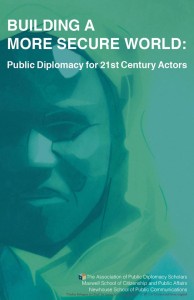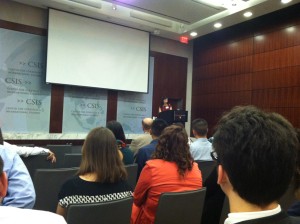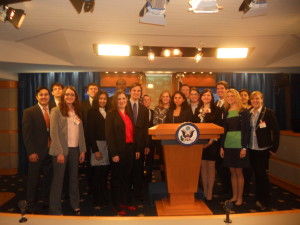On November 5th I had the good fortune to attend the annual Public Diplomacy (PD) symposium entitled: “Building a More Secure World: Public Diplomacy for 21st Century Actors.” The symposium is put on by PD students who are pursuing dual degrees in international relations through Maxwell and public relations through the Newhouse school. It’s a day-long event in Washington, DC., complete with speaker panels on issues of public affairs and diplomacy, networking events with alums and other professionals in the field, and plenty of free food and thought-provoking conversations. At every turn there was someone who had expertise in some specific niche of international relations, and through panels and small talk I learned so much about what others do around the world.

I attended this after my internship supervisor generously let me take the entire day off, and I will admit it was well worth it. My classmates came all the way from Syracuse to attend– and many of them weren’t even PD! It was an impressive feat of logistics and sheer student-power, and it was able to connect generations of Maxwell students with professionals in the field. I don’t have a PD background, but this event didn’t make me feel like I needed one. Simply by existing in the world that we have today, I’m already participating in the sphere of public diplomacy with a small “p.”
The world has undergone a communications revolution, and organizations both within governments and outside through NGOs and private companies all have to contend with the best ways to relay information and reach the necessary publics. Even if you’re involved in a technical field like security or IT, you still have to find ways to communicate to others– even if it’s just telling your family at Thanksgiving what you do for a living. Especially in my DC classes, which tend to focus more on the nitty gritty of security, I’ve found the ability to seamlessly convey a message to be indispensable. And, with so much information floating around, it’s become even more important to make sure that people know what you’re doing and want to help you do it.

At the end of the symposium, the keynote address was given by Anita Sharma who worked for the UN Foundation. She spoke about the UN Millennium goals and just how close the world was to achieving them. The speech was, as she put it, told through rose colored lenses, but in my opinion the optimism of it was no mistake. In many ways, the world is getting better– we’re more connected than ever, even in some remote regions. Medicine, technology, and networks are becoming more advanced and have more people connected than ever in human history. However, with things like poverty, violence, and environmental damage we still have a long road ahead, and it will take all of us working together to keep going in the right direction. I think it will be important to not only keep the hardships in mind, but to remember that things are still able to improve. We should use our optimism not to pretend issues of the world don’t exist, but to become energized to do something about them.
It’s no secret that when everything seems hopeless, you lose your energy to even try. Sharma’s main message that I took away was that instead of giving up, we should pay attention to what’s going right and use that to inspire us to continue to work for a better world. It can be easy to get sucked up into the day-to-day minutia that distract us from this, but I think events like this symposium are crucial in reminding us not to give up hope.
